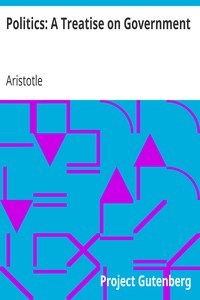| Author |
Aristotle, 385 BCE-323 BCE |
| Translator |
Ellis, William, 1730-1801 |
| Title |
Politics: A Treatise on Government
|
| Note |
Wikipedia page about this book: https://en.wikipedia.org/wiki/Politics_(Aristotle)
|
| Note |
Reading ease score: 29.6 (College graduate level). Very difficult to read.
|
| Credits |
Produced by Eric Eldred, and David Widger
|
| Summary |
"Politics: A Treatise on Government" by Aristotle is a philosophical treatise analyzing the concept of political systems and governance, likely written in the late 4th century BC. This foundational work explores the nature of cities, society, and the roles of citizens and governments, examining the relationship between ethics and politics, and how ideal forms of government can be attained. The opening of Aristotle's work sets the stage for his exploration of political philosophy by discussing the fundamental purpose of society and the city, emphasizing that every city must exist for a good purpose. He introduces the idea that legislation is essential in crafting a society conducive to a good life, positioning the legislator as a critical figure who should use knowledge and experience to govern effectively. Aristotle differentiates between political governance and other forms of authority, like monarchy and familial rule, stressing that a city is more complex than a household. The early chapters offer a definition of what constitutes a city, the natural roles within it, and the importance of establishing just governance, paving the way for a detailed discussion of various political systems in subsequent sections. (This is an automatically generated summary.)
|
| Language |
English |
| LoC Class |
JC: Political science: Political theory
|
| LoC Class |
PA: Language and Literatures: Classical Languages and Literature
|
| Subject |
Political science -- Early works to 1800
|
| Category |
Text |
| EBook-No. |
6762 |
| Release Date |
Oct 1, 2004 |
| Most Recently Updated |
Jan 24, 2013 |
| Copyright Status |
Public domain in the USA. |
| Downloads |
2320 downloads in the last 30 days. |
|
Project Gutenberg eBooks are always free!
|

